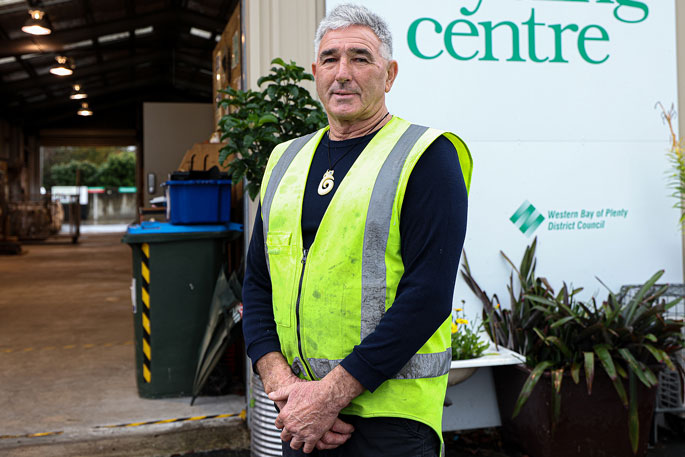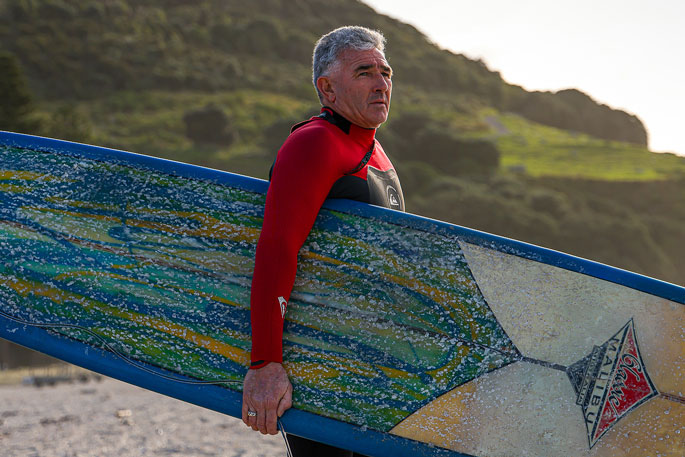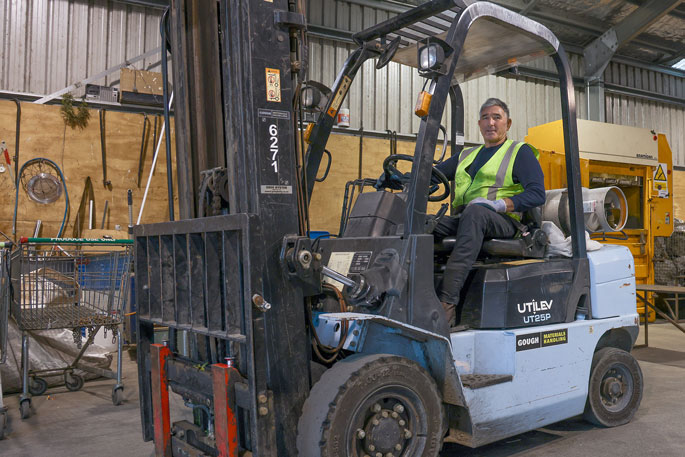A back injury put the working life of Michael Dixon (Ngāpuhi) into doubt and he struggled mentally.
But the support of ACC helped pull him out of that and find a new job he loves.
They say lightning doesn't strike twice but Papamoa resident Michael Dixon could be forgiven for not believing that.
The 68-year-old had finally returned to his job as a concrete layer after recovering from knee replacement surgery when disaster struck again – literally on his first day back on the tools.
'I was finishing off a floor with a power float, which is what we use to smooth it out,” he explains.
'But then I stepped backwards off the floor and into a post hole – there was a big crack when I hit the ground.”
Dixon initially tried to put up with the pain in his back and tough it out for the following days.
But his old boss convinced him to see a doctor after it soon became clear something wasn't right.
The official diagnosis was soft tissue damage and a lumbar disc prolapse – not good news for someone with such a physically-demanding occupation.
Injuries relating to prolapsed, or ‘slipped', discs are common in jobs involving heavy lifting and can cause severe back pain as the disc often presses on a nerve root.

With Dixon well into his seventh decade, his working future was now looking bleak.
'I was very down and despondent about it,” he admits.
'Working has been my whole life. I've still got a lot of life ahead of me and I didn't want to sit around and do nothing.”
Fortunately for Dixon, who is of Ngāpuhi descent, ACC was there to help him through these difficult times with the support of the Hāpai programme.
Hāpai is an initiative aimed at meeting the needs of injured Māori and their whānau in a culturally appropriate way.
It weaves Te Ao Māori principles and practices with case management based on the following principles: whakawhanaungatanga (relationship-building), tikanga (targeted support and training), whānau-centered, mana motuhake (upholding client and whānau mana) and Whāia Te Tika, ACC's Māori strategy.
'ACC is committed to providing whānau with a choice of services that deliver culturally appropriate care and uphold our obligations to Te Tiriti o Waitangi (The Treaty of Waitangi),” says Michelle Murray, ACC Tumu Pae Ora (Chief Māori and Equity Officer).
'Since September 2021, seven recovery team members (kaihāpai) from Rotorua, Whakatāne, Gisborne and Tauranga have trialled the Hāpai service offering to around 380 clients.
'We are currently developing Hāpai beyond trial phase with a view to offering the service more widely in 2023.”
As part of the programme, ACC helped Dixon return to work but the physical nature of concrete laying proved too taxing as he struggled to recover from his injury.

An avid surfer and previously very active for his age, Dixon also struggled to deal with having limited mobility during his recovery and his mental health soon suffered.
Dixon, who lives in Papamoa with his adult daughter and 12-year-old granddaughter, was provided with counselling that helped free him from a dark place.
'For most of my life, I've always tried to look on the positive side of things. But I started to feel deep down that nothing was going to work,” he says.
'I was ready to give up at one stage but seeing the psychologist made a big difference. Things became a lot clearer and I walked out of those sessions more and more positive each time.”
Expert medical advice and physio also played a key role in getting Dixon back to leading a full life. But it was another one of ACC's services that gave him a real boost.
Dixon was offered the opportunity to try rongoā Māori – the traditional Māori healing used by his ancestors.
Rongoā includes a range of different healing methods, including mirimiri and romiromi (bodywork), whitiwhiti kōrero (support/advice) and karakia (prayer).
'Everything freed up for me and I felt a lot better,” Dixon says. 'I could move more freely, so was able to work harder with the physio at the gym and that strengthened everything up again.”
The biggest turning point came when Dixon applied for a part-time job at the Te Puke Recycling Centre.

Given his advancing years and the fact he had just been through two serious injuries, his potential new employers weren't sure if he would be up to the job.
The support of ACC was crucial as they helped him get a forklift licence and arranged a trial period.
Dixon is now in the final stages of his return-to-work programme, with ACC continuing to provide ongoing physiotherapy and the guidance of an occupational therapist.
'I love my new job and it's worked out so well for me,” he says.
'Now I'm free to enjoy the rest of my life.”



1 comment
Good luck
Posted on 13-10-2022 13:43 | By Kancho
I wish him well . But in the back of my mind feel a little sad that people work into that age . Maybe they just love working but I'm not judging as circumstances through life sometimes means working longer. I feel privileged to have retired earlier and enjoy so much.
Leave a Comment
You must be logged in to make a comment.